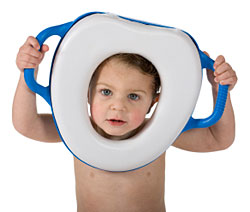The Key Is Not When You Are Ready But When The Child Is Ready
 When a baby learns to stand and walk, parents may begin thinking about teaching the child to use the potty. The key is not when you are ready, but when the child is ready. Problems in teaching children to use the potty almost always come from trying too soon. Typically, girls are ready before boys. Some children are ready around age 1, while others are not ready until age 3 or older.
When a baby learns to stand and walk, parents may begin thinking about teaching the child to use the potty. The key is not when you are ready, but when the child is ready. Problems in teaching children to use the potty almost always come from trying too soon. Typically, girls are ready before boys. Some children are ready around age 1, while others are not ready until age 3 or older.
When is a child ready?
Learning to use the toilet can start when a child has:
- Physical ability:
- is able to walk;
- has a larger bladder, so urinates fewer times a day;
- wakes up from a nap with a dry diaper;
- can control the muscles that hold and release urine and bowel movements; and
- can take underwear off and put it back on.
Mental ability:
- understands the body's signal for needing to use the toilet;
- understands words such as "peepee", "poopoo", and "potty"; and
- understands what is expected-when to go, what to do and where to do it.
Social and Emotional ability:
- can express needs, such as discomfort when she soils a diaper and tells you about it; and
- wants to learn to use the toilet.
How can you help your child learn?
- Talk with you caregiver. Parents and caregivers should agree on when a child is ready and what to do.
- Make sure the child can easily get to the toilet. Provide a potty chair in the bathroom or place a sturdy step stool by the toilet. Place toilet paper within easy reach.
- Dress the child in clothing that is easy to take off such as a dress, a skirt, or pants with an elastic waist.
- Use cloth training pants. Disposable paper training pants will seem like diapers to a child.
- Help your child overcome any fears of the toilet. The deep hole and loud flushing noise can seem scary. Fear of loud sounds could be a sign of other issues you may want to discuss with your child's pediatrician.
- Watch for signs that a child may need to go. This might include a frown or action such as holding the crotch.
- When the child urinates or has a bowel movement in the toilet, say "That's good". Avoid making to much of it. Children need to learn to use the toilet for themselves, not to satisfy you.
- Never scold or shame a child for an accident. These are natural body functions and children easily forget and get distracted.
- If a child has lots of accidents, go back to diapers for a while. Try again when the child seems ready.
Go slowly. Learning these skills takes time. Remember, the key is not when you are ready, but when the child is ready.




